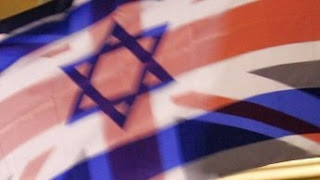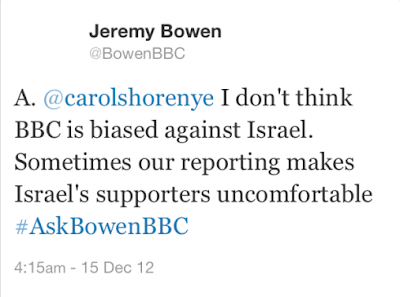Writes the reviewer, inter alia:
'The meat of Gilbert’s book and its uniqueness among hundreds on the Middle East published every year, however, documents the virtually ignored Jewish "nakba," a world used mostly by Arabs to described the "tragedy" of Israel’s birth....
The media of course have virtually forgotten (or hidden) this expulsion, preferring to fixate on the Palestinian refugee problem and the so-called “right of return.” That imbalance in the historical record and journalism of the 20th century goes hand in hand with coverage of the Gaza wars that focuses on the Israeli strikes on terrorist leaders and ignores the thousands of rockets fired at Israeli civilians.
But in this nakba the Jews now, tragically have company. The title of the book on one hand describes the intertwined history and tradition of Jews and Christians, but it also has become a description of the deadly agenda of Islamic fundamentalists: First, the Saturday people, second the Sunday people. In other words, first rid these countries of Jews and next go after the Christians. This they do with near international impunity. In Gilbert’s vivid and at time (appropriately) gruesome account of murders, church bombings and other anti-Christian atrocities she paints a portrait of a human rights catastrophe playing out before our eyes and a world gone mad, indifferent to and largely unaware of the plight of Christians. She meticulously documents the atrocities against the Egyptian Copts and other Christians from Nigeria to Iran to Indonesia and Afghanistan.
Her message is poignant, namely that Jews and Christian share a common tradition and faith, founded on ” biblical principles, founded on the sanctity of life, affirming that humans are made in the image of God . . . Our roots are firmly planted in common ground. … We have chosen life and we deplore the Islamist culture of death. We needn’t fight our battles alone.” That’s an optimistic note for a tragic story in which Christians and Jews, who certainly have at times not been on the same side, have a new brotherhood of faith, forged in the fire of Islamic fundamentalism. It is a timely reminder of the nature of our shared enemy and the obligation for shared defense in the cultural, ideological and military war against the jihadist culture of death.'Read all of Jennifer Rubin's article here
From Nick Gray of recently established site Christian Middle East Watch comes an insightful article entitled "Christian NGOs and Israel" that begins:
'A few days ago, the Commentator published an article by me ... on the reasons why so many Christian organisations working in the Middle East are hostile towards Israel. There are a good number of excellent pro-Israel organisations, who seek to serve both sides of the divide in Israel and who successfully keep an apolitical stance. Why can so many others not do the same. If the organisations working in Palestinian areas insist on being so poisonously anti-Israel, why do the pro-Israel groups not behave in the same way? Who is showing a more Christian face to the world; the ones serving Palestinians while pouring vitriol on Israel, or the ones quietly serving both communities and hating neither?
Dexter Van Zile ("Why are Christian charities bashing Israel?" 15th December) admirably exposed a major problem in the Christian development agency universe; a problem that too often seems to focus on only one geographical area in the whole world. Embrace the Middle East (an evolution of a long-standing agency with a history of excellent work on behalf of the poor of the Middle East), Christian Aid, World Vision, The Amos Trust and many others do provide aid to the poor and they do engage in commendable development projects in the cultural and religious turmoil we call the Middle East. Sadly, however, the majority of such charities seem to have an unacceptable political bias where this one geographical area is concerned - that narrow strip of land popularly known as "Israel-Palestine" or "Palestine-Israel" depending on your worldview! As someone who has worked in the Christian charity sector for over 25 years and with a special concern in the Middle East, I would like to offer a four point rationale for this anomaly in the mindsets of otherwise thoroughly admirable, caring organisations.' Read the rest hereAnd from Hadar Sela the indispensable new site BBC Watch comes a characteristically masterly exposé of the BBC's persistent failure to appreciate that the 1949 Armistice lines do not constitute borders. See that excellent post here




















